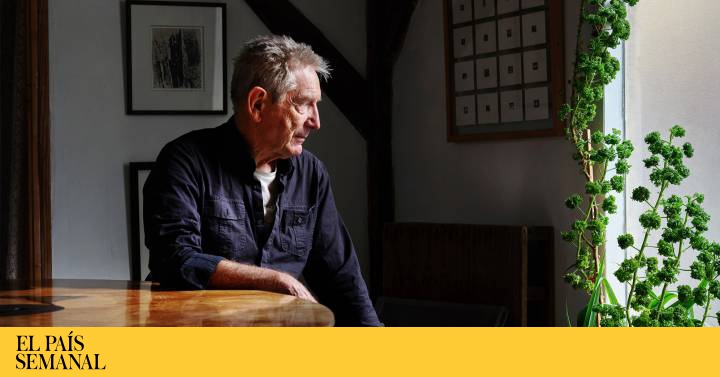At the Versailles School of Landscaping, Gilles Clément —77 years old — teaches what not to do.
Although he prefers to define himself as a gardener - because he always works with living things and a landscaper can use materials such as concrete - he is also a widely translated essayist and horticultural engineer.
Author of the garden of the Museum of the Quai Branly, he has devised orchards in Switzerland, Chile, Paris or Lille with one characteristic in common: low maintenance and the horticultural mixture that saves lots of species from disappearance.
He wrote
Manifesto of the third landscape
—the one that is lost in the open fields and, nevertheless, saves vegetation in danger of extinction— and coined the terms “garden in movement” —the one that the birds sow— and “garden of resistance” —the that hardly needs any care.
A brief history of the garden
(like all, published by Gustavo Gili) is his most autobiographical title, and in which he reveals how he learned by walking around the world.
In Cameroon, looking for butterflies, he discovered an
unlisted one
that today bears his name:
Buneopsis clementi.
In addition to the garden he planted to experiment with where he was born, in Argenton-sur-Creuse, 300 kilometers from Paris, Clément has a studio in a former carpentry shop in the Saint-Antoine district of Paris.
He himself reformed it with skylights so that the sun could reach the plants.
He explains, in the excellent Spanish he learned in Latin America, that to take care of them he must get on the piano.
He had to unlearn what he had learned because he had been "taught to kill."
Killing instead of caring.
In the first courses they taught you to recognize plants.
Then just how to get a high yield by growing each one.
To make the crops profitable, you have to conserve one species and kill the rest.
That is agriculture today.
The only goal is money.
That's what studies are today.
But you are a professor at the School of Versailles ...
And I try to teach another story.
If you look at it, the gardeners are protected like soldiers and are dedicated to killing to make it look beautiful.
The field has become dangerous, what we plant is full of poisons.
It is a fantasy to think that this poison is not going to affect us.
As a child, you were poisoned by a pesticide.
I was in a coma for three days from the dust fumes to kill aphids on climbing roses.
What was he doing working?
Take care of the garden.
My parents didn't have time.
What did they do?
I was seven years old when my father was commissioned to run a wine business in Algeria.
We spent seven years in Oran.
He bought wine and sold it in Paris to mix it with a lower quality French one.
The Algerian had more alcohol and that made him keep better.
What do you remember from that time?
From the boat I saw for the first time in my life a straw-colored landscape.
There was nothing green.
It was the end of the summer.
I thought: "How can we live in a country where there is no green?"
I was so used to the forests ... Then I learned that green comes, in winter, after the rains.
What did you learn in Africa?
The main thing, that there were two different human populations: the Arabs and us.
I realized that we didn't have enough contact to learn from each other.
My parents and their friends talked about them as if they were second-rate humans.
But I didn't think so.
Walking to the school I met many Arab people.
And they always helped me.
I was a child, and the community protects children.
That made him unable to understand what he was hearing at home.
Did you question your parents?
No. I was afraid not to think like them.
And trying to convince them was too difficult.
It was questioning his life.
Besides, my brother thought like them.
Were they very stiff?
Mentally.
It was the world of the provincial bourgeoisie.
But open-minded enough to go to Algeria.
Within a group and to earn money.
They did not travel to meet.
Anyway, that made me spend many years being a mute in my house.
Well ... I've changed.
What does your brother do?
He works in the international gasoline business.
We inhabit two completely different worlds.
Perhaps thanks to that I began to think about how to live independently.
I wanted to think with my head.
What he did as a child - think for himself - he repeated as an adult, questioning what he learned in college, when he decided to eradicate pesticides from his gardens.
I started by being guided by what the teachers had told me.
He used poisons.
He didn't know how to do it any other way.
How did you find out?
In 1977 I bought a piece of land to work without pesticides.
It had been abandoned for 15 years and it was a thicket, but I decided to protect what was there.
Not everything, because I could not even enter.
Today there are caterpillars and butterflies that live on blackberries.
Blackberries are good, and bramble is a defense against some animals for younger trees.
They have their role.
So I decided that I would try to maintain diversity.
How do you teach it?
Instructing both in non-action and in action, and in indecision as well as in the decision to consider a counterpoint to the established order.
It is difficult to change the cultural model.
Most people don't think of weeds as having a useful role in the ecosystem.
I teach to use the plant world in an intelligent way.
I didn't invent it, I learned it while traveling.
Was he looking to meet or know himself?
I think it goes together.
Perhaps I have traveled too much taking into account the harmful role for the world that we now know that flights have in the environment.
But I never traveled as a tourist.
Julie Glassberg
How did you travel?
Very slowly.
Walking a lot and to learn about the local flora in places like Chile, Central America, South Africa or South Australia, which have a Mediterranean climate.
Despite defending the movement, it took hold. He has children?
A daughter who is a graphic artist and lives in Paris with her partner.
Still riding a motorcycle?
Yes, I have it in a garage here in Paris.
You would imagine someone like you more riding a bicycle.
Clear.
It would be better.
I also have.
It is that of my wife, who died a year ago.
Whoops.
She was also a gardener.
But he worked with local collectives and associations.
I also have a car.
And that is even more contradictory.
Where did you learn Spanish?
In Nicaragua.
I spent two years working as a technical advisor at the Liceo Agrícola.
It is the king of weeds.
I protect them all.
The good and the bad, but I never use the word weed.
Each one has its role.
It protects everything. Mosquitoes don't bother you?
Yes. I think it's the only insect I kill.
Still, I look for alternatives to avoid them: bats eat them.
They are natural insecticides.
We must protect all animals because together they regulate nature and maintain balance.
His "third landscape" is more ethical than aesthetic.
It is ethical and aesthetic.
They are places of no function: roadsides, for example.
But they are the refuge of diversity.
The free coexistence of many species requires a more humanized culture.
We are used to admiring order in a garden and that is an imposition.
The beauty of a garden in motion is the freedom of plants.
It's like when you go to a forest, you are looking for truth rather than order.
The remains that I call "third landscape" are bastions because among the disinherited, the diversity of nature is preserved.
Does the same thing happen in society?
Human?
Yes. I hadn't thought about it, but yes: survival equals everything.
Is there no virgin nature?
It exists in dreams.
When talking about the Amerindians, it is known that the jungle that seems natural and wild in reality is not.
There are treated plants.
They don't stir the dirt, which is very smart.
Why?
Because in tropical climates the rain falls hard and the water rises with the evaporation of the sun's heat and would steal the minerals.
The soil solidifies and that hard layer maintains the minerals, maintains life.
Wouldn't the earth have to be stirred? We all do it when caring for a garden!
It's stupid.
But 10 or 15 centimeters is nothing.
The machines that go deeper are the ones that damage the ecosystem.
Is landscaping an art? An ethic? An industry?
It should not be an industry, although many gardens are maintained with machines that blow on the lawn to collect the leaves and dry the substrate killing life.
Would it be better to leave the leaves?
They are a natural compost.
What if we slip? You are 77 years old ...
We remove them from the roads and learn to walk carefully.
Are you in favor of bonsai?
In favor in China or Japan, because there those who care for them know the meaning of care.
For them they correspond to a cosmogony, a way of seeing the world that places spirits on top of the mountains and men on the foot.
It is a culture.
But they are imported landscapes.
When we make a bonsai we turn it into an object, a decoration.
Seeing a bonsai in a European house does not interest me much.
Nor will you be interested in seeing grass.
Noooo.
But if you don't cut the grass, it dries up.
What do you have against dry grass?
In Japan they plant one that turns yellow in winter and contrasts with the green of the trees.
The best thing about nature is when everything — the biological, the aesthetic, and the symbolic — makes sense.
In California they can't stand the color changes that the seasons produce.
There are companies that paint the lawn green.
Then they go to see the color change of the leaves to New England.
We are crazy.
The flower market is also damaging to diversity.
It has drastically reduced the species so that the most resistant live.
Do you never buy flowers?
No. Sometimes I take one from the garden to bring it home, but nothing more.
Didn't he buy from his wife?
Seldom.
Do you buy fruit for looks?
No. I have an apple tree.
The one that is chopped is usually the best apple.
When you go shopping, do you also take the picada?
The small ones are usually the ones with the most flavor.
Many farmers use products 20 or 30 times a year to overgrow fruit.
Julie Glassberg
He has criticized the reducing power of the Common Agricultural Policy (CAP).
Industrial land use for crops and animals has destroyed landscapes and limited and impoverished crops.
There are few plant species and they grow industrially.
It is stupid and dangerous.
The good news is that the resistance against the total industrialization of the planet is increasing.
There is a growing public demand for pesticide-free products.
That scares power.
Why is organic so expensive?
Less pesticide means more labor.
And also more employment, but less revenue for the owners.
We have changed the model of desire.
Before we spent money on what we ate and paid for because it was healthy.
Now we pay to make it ... nice?
We pay much less for food now than we did a decade ago.
There are so many cheap foods that good ones seem expensive.
It is not.
It is the real price so that it is well cared for.
Do looks and money define our society?
Society is shallow and money is horrible.
Has it never been lacking?
No. I don't know how to use it.
I have a house and a garden, what I have left over I give to my friends who need it.
He will have many friends.
Some come to live here.
He also coined the term "garden of resistance."
I show the students a lot and ask them to describe what we could do taking into account the immovable: the nature of the terrain, the climate, the neighbors… I ask them to make a list of the living things that could live there without help.
If you do that, maintenance is not an expense.
Not even the use of water shoots up.
It is, therefore, a sustainable garden.
Can a garden be political?
You can teach another way of dealing with nature.
You can defend a neighborhood space ...
In 2007 he left the French State commissions.
We knew who Sarkozy was.
We knew his capitalist and ultra-liberal way of thinking from his work at the Ministry of Finance.
We wondered if making gardens for someone with those ideals was not making up their actions.
What does the garden of resistance seek to resist?
Everything.
The gardener uses what he thinks will last.
Even forbidden plants like nettles.
Nettle puree is a perfect insecticide.
It can be made at home to fight insects and predators by reinforcing the strength of the plant itself.
Why is it prohibited?
Because it is free.
The argument is that it is dangerous.
The dangerous thing is the pesticides.
So when I did my resistance garden, I decided to disobey and puree nettles as a natural insecticide.
What else is forbidden and would serve the world?
Lots of things: there is an archaic way to grow corn by mixing it with beans and plants from the zucchini family.
They are planted in a zigzag.
All three crops help each other and do not need pesticides.
How did you find out?
In Mexico, Nicaragua and Guatemala.
He had seen it in a film by French director Marie-Monique Robin.
Gardeners know: nothing remains, everything changes. Why is it so hard for us to accept it?
Everything would make more sense if we understood that the only constant in life is change.
That is the teaching of nature: the fixed vision of permanence is contrary to life.
I don't know how you can defend something like that.
In nature it does not exist.
But obtaining autonomy of spirit is difficult.
There are many people who obey the law of money and do not look for other possibilities.
But there are.
How did you find out that you liked to write?
I was shy.
I didn't speak to anyone, but I wrote a poem.
Did you read it to your mother?
Yes!
And he likes me.
Then I kept writing and when I became a teacher I needed to organize my ideas.
He has even written a dystopian novel.
Above the clouds that contain poisons that humans have used, they evaporate and fall on us.
How did you come up with it?
The first time they tried to get a harmful product to the clouds was during World War II to make it rain more.
This is what Lamarck did, who is the true inventor of the theory of evolution.
Not Darwin?
Jean-Baptiste Lamarck wrote 50 years earlier.
And he spoke of transformism: during the life of a human, animal or plant being, if there is a crisis or a struggle, he transforms and passes that message, in the form of genetic transformation, to his children.
Few people know this because Darwinism is perfect for the economic model.
He who is a stronger conqueror than the others, passes.
The one that does not ..., we are left without knowing what happens to him.
Nature is a great unknown.
We thought we were destroying her, but she is going to destroy us.
The moment we get to know it, we immediately protect it.
The most important thing today is that young people learn what nature is so that they know where we really live, not in a virtual world.











